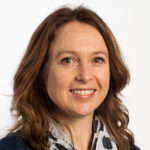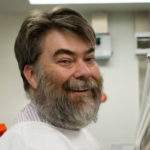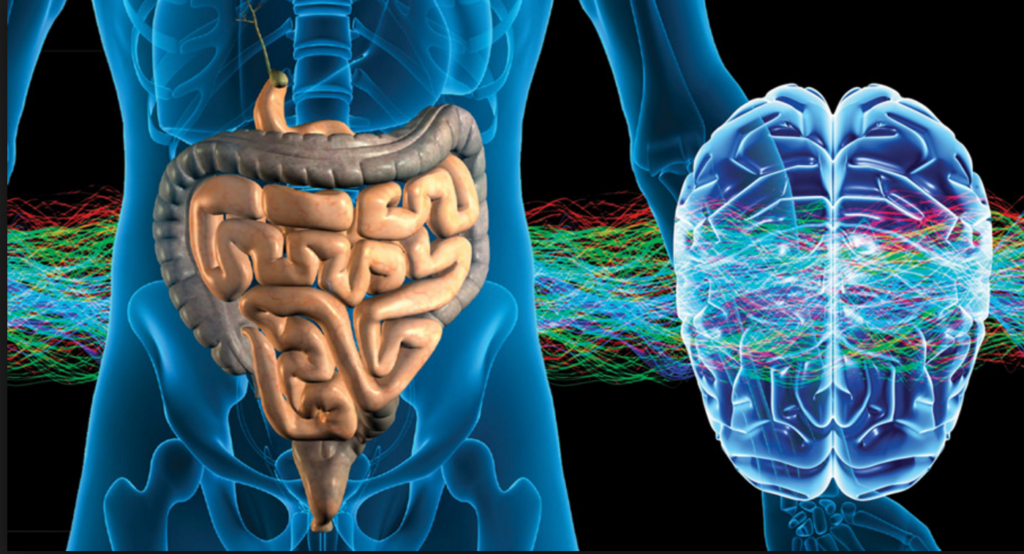Mind over Faecal Matter: Gut Biome & Mental Health
 Speakers:
Speakers:
Associate Professor Elisa Hill-Yardin,
ARC Future Fellow & Vice-Chancellor’s Senior Research Fellow, School of Health & Biomedical Sciences, RMIT University
Associate Professor Ashley Franks,
Leader of Franks Lab for Applied and Environmental Microbiology, Reader for Physiology, Anatomy & Microbiology, La Trobe University
Spoiler: we really do have gut feelings.
Food is something we find ourselves always thinking about and there’s a good reason for that. We have a ‘second brain’ in our gut that regulates the digestion and movement of our food from one end of the gastrointestinal tract to the other. Our gut brain and main brain are connected and influence mood, behaviour and mental health.
Our gut is home to trillions of microbes in our gut that make up one third of faeces. Over the last decade, scientists have realised that most of these bacteria are beneficial to both our brain and our guts, and without them our guts don’t function properly.
People with autism often suffer from gut problems, but nobody has known why. Our work has discovered the same gene mutations – found both in the brain and the gut – could be the cause. These gene mutations cause changes in how the gut works as well as changing the balance of the bacteria in the gut. Different gut bacteria in turn alter gut function and worsen gut health via a detrimental feedback loop.
Join Associate Professors Elisa Hill-Yardin and Ashley Franks, who will discuss how changing the way neurons communicate in the brain can alter the gut and the microbial communities we need for health. They will explore how combining neuroscience, microbiology and advanced genetics allows us to provide a holistic view of the gut-brain axis, how it becomes unbalanced and how we can engineer changes to ease dysbiosis and gut dysfunction.
About the speakers:
 Associate Professor Elisa Hill-Yardin is an ARC Future Fellow and Vice Chancellor’s Senior Research Fellow at RMIT University. She leads the Gut-Brain Axis laboratory in researching how the nervous system interacts with microbes in health and disease including in autism-associated gut dysfunction. After completing her PhD in Neuroscience, Dr Hill-Yardin trained at the ESPCI ParisTech University in France as a CNRS Postdoctoral Fellow studying neuron subtypes in the rodent brain. She returned to Melbourne in 2006 as an NHMRC Howard Florey Centenary Fellow before receiving a prestigious US Department of Defense Idea Development Award. She was also awarded the Joliot Chair for French-Australian collaborative projects and a Melbourne University Dyason Fellowship in 2015. Dr Hill-Yardin regularly communicates research to the public including via mainstream media. She is a founding member and Chair of Frontiers in Neurodevelopmental Disorders (FiND), which enables leading international researchers to engage with scientists, clinicians and families.
Associate Professor Elisa Hill-Yardin is an ARC Future Fellow and Vice Chancellor’s Senior Research Fellow at RMIT University. She leads the Gut-Brain Axis laboratory in researching how the nervous system interacts with microbes in health and disease including in autism-associated gut dysfunction. After completing her PhD in Neuroscience, Dr Hill-Yardin trained at the ESPCI ParisTech University in France as a CNRS Postdoctoral Fellow studying neuron subtypes in the rodent brain. She returned to Melbourne in 2006 as an NHMRC Howard Florey Centenary Fellow before receiving a prestigious US Department of Defense Idea Development Award. She was also awarded the Joliot Chair for French-Australian collaborative projects and a Melbourne University Dyason Fellowship in 2015. Dr Hill-Yardin regularly communicates research to the public including via mainstream media. She is a founding member and Chair of Frontiers in Neurodevelopmental Disorders (FiND), which enables leading international researchers to engage with scientists, clinicians and families.
 Associate Professor Ashley Franks is the Director of Research for La Trobe University’s School of Life Sciences, where he has established the Franks Lab for Applied and Environmental Microbiology, investigating microbial community structure and functions at interfaces. Together with colleagues and students, he has active research projects looking at the interactions of mixed microbial communities with plants, soils, microbiome, electrodes, sewer systems and submarines. For his research he has received a number of awards and funding from national and international sources. Ashley completed his PhD in marine microbial ecology at the University of New South Wales, after which he was awarded a Government of Ireland Fellowship in Science, Technology and Research for research conducted at University College Cork regarding microbial interactions in the plant rhizosphere. Dr Franks then gained a position within the Geobacter Project at the University of Massachusetts Amherst, where he leads projects in the Extracellular Electron Transfer Group, and was involved in collaborations with research groups at the Naval Research Laboratories, Cornell University, the University of Toronto, the University of Illinois at Chicago, and Harvard University. He joined La Trobe University in 2011, and has recently been made a member of the Australian Research Council College of Experts.
Associate Professor Ashley Franks is the Director of Research for La Trobe University’s School of Life Sciences, where he has established the Franks Lab for Applied and Environmental Microbiology, investigating microbial community structure and functions at interfaces. Together with colleagues and students, he has active research projects looking at the interactions of mixed microbial communities with plants, soils, microbiome, electrodes, sewer systems and submarines. For his research he has received a number of awards and funding from national and international sources. Ashley completed his PhD in marine microbial ecology at the University of New South Wales, after which he was awarded a Government of Ireland Fellowship in Science, Technology and Research for research conducted at University College Cork regarding microbial interactions in the plant rhizosphere. Dr Franks then gained a position within the Geobacter Project at the University of Massachusetts Amherst, where he leads projects in the Extracellular Electron Transfer Group, and was involved in collaborations with research groups at the Naval Research Laboratories, Cornell University, the University of Toronto, the University of Illinois at Chicago, and Harvard University. He joined La Trobe University in 2011, and has recently been made a member of the Australian Research Council College of Experts.







